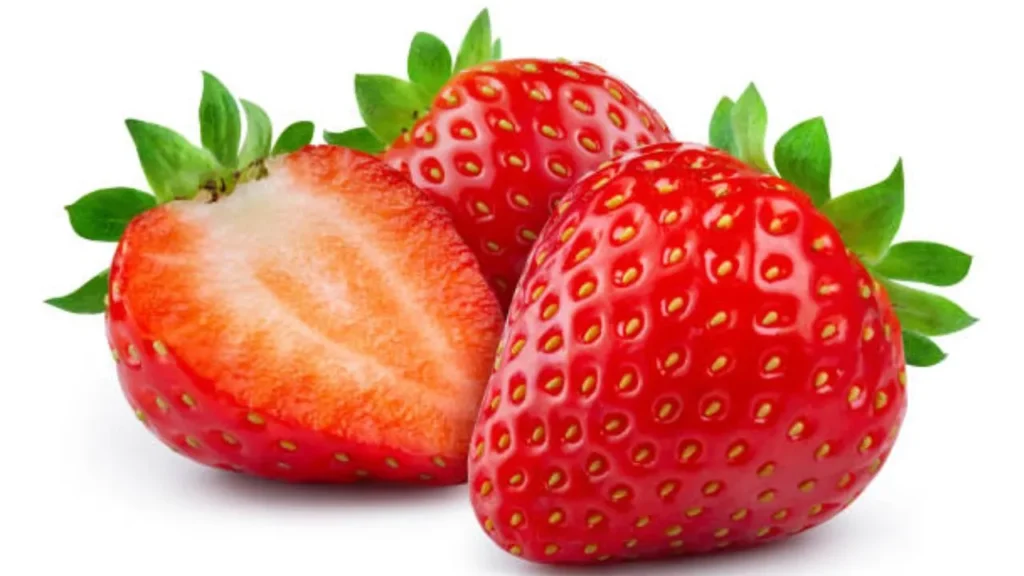Dogs are known for their love of food, and as pet owners, we often wonder if our dogs might enjoy the same things we eat. One such fun fruit that may come to mind is the strawberry. This vibrant red fruit is delicious and full of nutrients. But one question that often comes to mind is, “Can dogs eat strawberries?”
Strawberries are low in calories and fat, making them a healthy dog snack. They are also a good source of vitamins, including vitamin C, which can boost your dog’s immune system and promote overall health. Dogs can eat strawberries and enjoy their delicious taste while reaping the nutritional benefits. However, it is essential to give strawberries to dogs in moderation and take the necessary precautions to ensure their safety.
Can Dogs Eat Strawberries?
Yes, dogs can eat strawberries. Strawberries are safe for dogs and can be a tasty and healthy treat. They are low in calories and fat, making them a good option for dogs on a balanced diet. Strawberries are a great source of vitamins and antioxidants that can benefit dogs. Strawberries are a great source of vitamin C, which can boost the immune system and support overall health. They also contain fiber, aiding in digestion.
However, it’s essential to feed strawberries to dogs in moderation. Too many strawberries can lead to an upset stomach or diarrhea. Preparing strawberries properly before offering them to your furry friend is also crucial. Wash the strawberries thoroughly to remove any dirt or pesticides. Additionally, remove the green leaves and stems, as they can be difficult for dogs to digest.
Health Benefits of Strawberries

Strawberries are not only delicious but also offer a range of health benefits. Here are some of the vital health benefits of strawberries:
Rich in nutrients
Strawberries contain essential vitamins (such as vitamin C, K, and folate) and minerals (such as potassium and manganese). These nutrients are necessary for overall health and affect various bodily functions.
Antioxidant properties
Strawberries are a great source of antioxidants, including anthocyanins, ellagic acid, and quercetin. Antioxidants help protect the body against oxidative stress and damage caused by harmful free radicals.
Boosts immune system
Strawberries’ high vitamin C content can help boost the immune system, which is vital in defending the body against infections and diseases.
Promotes heart health
Strawberries benefit heart health due to their high content of antioxidants, fiber, and flavonoids. They can help reduce the risk of heart disease by improving cholesterol levels, reducing inflammation, and promoting healthy blood pressure.
Supports brain function
The antioxidants and phytochemicals present in strawberries have been linked to improved brain function and memory. They may help protect the brain from age-related decline and reduce the risk of neurodegenerative diseases.
Aids in digestion
Strawberries are a good source of dietary fiber, aiding digestion and promoting bowel regularity. It’s important to note that while strawberries offer numerous health benefits, they should be consumed as part of a balanced diet and in moderation.
How Many Strawberries Can a Dog Eat?
The number of strawberries a dog can eat depends on the dog’s size and tolerance. Generally, it is recommended to give strawberries to dogs in moderation. Smaller dog breeds can have around 1-2 strawberries per serving, while larger dog breeds can have a few more.
It is important to remember that strawberries should be given as a treat, not as a central part of the dog’s diet. While strawberries are generally safe for dogs, too many can cause an upset stomach or diarrhea due to the natural sugar content. If you are introducing strawberries to your dog’s diet for the first time, it is best to start with a small amount and observe how your dog reacts.
Can Dogs Eat Frozen Strawberries and Strawberry Ice Cream?
Yes, dogs can eat frozen strawberries, but taking some precautions is essential. Frozen strawberries can be a refreshing and healthy dog treat, especially during hot weather. However, it’s necessary to ensure that the strawberries are plain and free from added sugars, sweeteners, or artificial flavorings.

As for strawberry ice cream, it’s generally not recommended to feed it to dogs. Most commercial ice creams contain sugar, dairy, and additives, which can harm dogs. Dairy products can be complex for some dogs to digest and may cause gastrointestinal upset, such as diarrhea or stomach discomfort. Additionally, the high sugar content in ice cream can contribute to weight gain and dental issues in dogs.
Can Dogs Enjoy Strawberries and Blueberries?
Dogs and berries may seem like an unlikely pairing, but the good news is that many dogs can safely indulge in the sweet and vibrant flavors of strawberries and blueberries. These bite-sized fruits make for tasty treats and pack a nutritional punch for our furry friends. Strawberries are rich in vitamin C, antioxidants, and fiber, promoting a healthy immune system and aiding digestion. Similarly, blueberries are bursting with antioxidants and vitamins, contributing to improved cognitive function and overall well-being for your canine companion.

However, moderation is key when incorporating berries into your dog’s diet. While strawberries and blueberries are generally safe, removing the stems and pits is essential, as these can pose a choking hazard or cause digestive issues. Too much of a good thing can also lead to an upset stomach, so it’s wise to introduce berries gradually and observe your dog’s reaction. Always consult your veterinarian before significantly changing your pet’s diet, especially if they have any pre-existing health conditions or allergies.
Can Dog Eat Strawberries Leaves?
When treating your furry friend, strawberries are a delightful and healthy option. However, it’s crucial to know that while the juicy red fruit is generally safe for dogs, the same can’t be said for the leaves. Strawberry leaves can be mildly toxic to some dogs due to oxalic acid. While the levels are usually not high enough to cause severe harm, it’s still best to err on the side of caution.

Ingesting strawberry leaves in small amounts may not pose a significant risk, but monitoring your dog for any signs of discomfort or digestive upset is essential. If your canine companion happens to nibble on a strawberry plant, keep an eye out for symptoms like vomiting, diarrhea, or lethargy. If you notice any adverse reactions, it’s advisable to contact your veterinarian promptly.
Read More: 10 Best Dog Breeds For Families With Kids
Conclusion
In conclusion, strawberries can be a safe and healthy treat for dogs. They are low in calories, packed with nutrients, and have several health benefits. Dogs can enjoy the delicious taste of strawberries while benefiting from their vitamin C, antioxidants, and fiber. However, feeding strawberries to dogs in moderation and preparing them properly by washing and removing the green leaves and stems are essential.
While strawberries are generally safe, too many can cause digestive issues. It’s always best to introduce new foods gradually and observe how your dog reacts. If you notice any adverse reactions, it’s advisable to stop feeding strawberries and consult with a veterinarian. Strawberries can be a tasty and nutritious addition to a dog’s diet when given appropriately and as part of a balanced diet.

